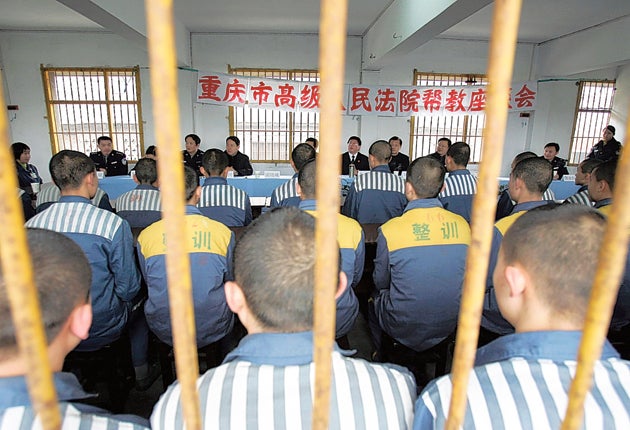Supreme Court rules China must stop using torture to extract confessions
'Illegal methods must be eliminated', court statement says, but human rights activists say any change remains to be seen

Your support helps us to tell the story
From reproductive rights to climate change to Big Tech, The Independent is on the ground when the story is developing. Whether it's investigating the financials of Elon Musk's pro-Trump PAC or producing our latest documentary, 'The A Word', which shines a light on the American women fighting for reproductive rights, we know how important it is to parse out the facts from the messaging.
At such a critical moment in US history, we need reporters on the ground. Your donation allows us to keep sending journalists to speak to both sides of the story.
The Independent is trusted by Americans across the entire political spectrum. And unlike many other quality news outlets, we choose not to lock Americans out of our reporting and analysis with paywalls. We believe quality journalism should be available to everyone, paid for by those who can afford it.
Your support makes all the difference.Torture as a method for extracting confessions must be “eliminated”, the Chinese Supreme Court has ruled.
It came as the country’s highest court said it would work towards addressing a number of different practices condemned by rights advocates, from forced labour camps to judicial corruption.
Using torture to coerce suspects into giving confessions– often publicly, and before a trial has begun – is acknowledged as a widespread practice in China.
In a statement on its official microblog account, the Supreme People’s Court said it would be clamping down on interrogation techniques that are already banned, but the use of which is overlooked.
It said: “Inquisition by torture used to extract a confession, as well as the use of cold, hunger, drying, scorching, fatigue and other illegal methods to obtain confessions from the accused must be eliminated.”
The court has also introduced more stringent rules for death penalty cases, increasing the burden of evidence on prosecutors and saying that only experienced judges should handle capital punishment trials.
China's government said last week it would work to reduce the number of crimes subject to the death penalty.
The Supreme People's Court comments were part of a statement on weeding out false charges in legal cases and follow a landmark package of reforms last week, including abolishing forced labour camps and freeing courts from political influences.
But judicial independence in China is often just given lip service, as courts ultimately answer to the Communist Party.
“The problem is always with the implementation,” said Nicholas Bequelin of Human Rights Watch.
“In the judicial system in China the public security system is by far the most powerful institution, and there are effectively very few checks and balances on how it exerts its power.”
Rights advocates have long called on China to better safeguard the rights of the accused. Coercing confessions through torture and other means is a widespread practice, with some defendants in high-profile cases confessing to crimes in public before trials have taken place.
Torture is also rampant in the ruling Communist Party's own internal judicial system, laid bare in a September case, in which six interrogators were charged with drowning a man by repeatedly dunking him in a bucket of ice-cold water.
The Supreme People's Court also emphasized that courts much not yield to pressure from the media or “unreasonable petitioning by litigants.” Public outrage has sometimes swayed verdicts in high profile cases.
The court released a paper late last month calling for an end to corruption in courts and for officials to stop interfering in decisions.
Additional reporting by agencies
Join our commenting forum
Join thought-provoking conversations, follow other Independent readers and see their replies
Comments